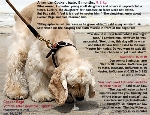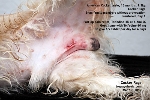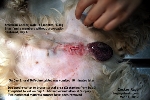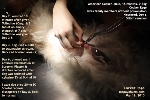|
Toa Payoh Vets Clinical
Research
Making veterinary surgery alive
to a veterinary student studying in Australia
using real case studies and pictures |
|
Why the dog is still aggressive
after neuter?
Dr Sing Kong Yuen,
BVMS (Glasgow), MRCVS
17 March, 2010
|
 Cocker
Rage is a form of dog aggression
that exists not only in the Cocker
Spaniel breed. The dog, usually
male, bites family members when
unprovoked. This dog had no
problem at the groomer. Various
causes have been given. What is
the solution? Neutering early is
one solution. Cocker
Rage is a form of dog aggression
that exists not only in the Cocker
Spaniel breed. The dog, usually
male, bites family members when
unprovoked. This dog had no
problem at the groomer. Various
causes have been given. What is
the solution? Neutering early is
one solution. |
 |
 |
 |
|
|
 |
 |
|
Tolfedine's pain-killer effects on
the Cocker Spaniel |
This Cocker Spaniel
was neutered at 15 months after the father finally
agreed to the neuter. The two young adult daughters
were aware of the "Cocker Rage" syndrome but had not
been able to persuade the father to neuter the dog.
The father got bitten. The two daughters' wrist and
lower arms were scarred. "I feel it is too cruel," the
father said. He was the type who believed in spanking
the dog to make it obedient. This dog was not afraid
of spanking. Why? It could be his personality. Also, I
observed he had the "big mountain" behind him - the
care and backing of the two daughters who would tell
the Dad off if he wants to discipline the young dog
with negative reinforcement training.
"The dog gets more ferocious as he grows older," I
said. "Neutering may reduce his aggression." My
assistant, Mr Saw was most cautious as it was his job
to muzzle this fierce dog whom I had earlier touched
and examined without being bitten. It was my
assistant's job to muzzle him for taking temperature
and Mr Saw has the scars and experience to do it and
to show the intern, Tanya how it should be done.
The father surprisingly agreed to the neuter. The dog
came in for his vaccination and since the father said
yes, I did not give him time to go home and think
about it. This dog could end up being euthanased in
later years as he gets stronger and wiser in his
biting pre-emptive strikes. That would be very sad for
the 2 daughters who love him very much. One of them
showed me her right arm scars. They were like black
paint strokes and there were many of them. I was
shocked.
The dog was muzzled and given the Dormitor
pre-anaesthetic sedation. He vomited white froth 5
minutes later. After 10 minutes, he was masked with
isoflurane gas. He still struggled for a while. I
intubated later and his neuter was uneventful.
I have had used Tolfedine pain-killers in other dogs
after neuter and spay. There were no complaints in
most cases. In this case, I had the feedback from the
daughter and it was surprising. The dog tried to
scratch his scrotal area with his e-collar on Day 3.
Why?
Well, on Day 2 after surgery, he vomited out the
tablet at 7 am when he was dosed on an empty stomach.
For practical purposes, he did not get the dosage.
This would be the reason. By Day 6, I saw him and got
the stitches out. The wound was wet as it was covered
up under a plaster but not infected. There was some
inflammation as you can see from the picture.
With prednisolone 20 mg SC, the dog went home and no
more complaints of attempts at the scrotum. The collar
would be taken out at Day 10 and all should be well.
"Why is the dog still so aggressive (towards me)?" the
father asked me at Day 6 when the dog came in for me
to examine. The dog just snapped at him. "Yesterday,
he bite a child's hand," the father told me about his
friend's child who approached the dog. "He has been
grouchy." The father had two incredibly obedient and
good guard dogs earlier. A German Shepherd and a
Rottweiler. Both had passed away. "The Rottweiler kept
following my brother who was pulling my daughter on a
leash one day." he told me. "The Rottweiler was
looking at me and at him waiting for my instructions
to attack. My brother was just having some play and
fun with my daughter."
"What did you do?" I asked. A Rottweiler's attack in
defence of the family child is ferocious.
"I approached my brother and asked him to stop
walking, not to look at the Rottweiler. He was to
release the leash. So, nothing happened."
Now, the Dad had an incredibly temperamental biting
dog. "It will take some time to know the effects of
neutering and whether the dog will bite family
members," I said to the father. "The male hormone,
testosterone is still present in his bloodstream.
Also, you need to use positive reinforcement training
to get him not to bite you and family members." Easier
to advise on social dominance and submission theories
and said than done, I guess. |
|
|
 Toa Payoh Vets Toa Payoh Vets
Clinical
Research |
|
|
Copyright ©
Asiahomes Internet
All rights reserved. Revised: March 17, 2010
Toa
Payoh Vets
| |
 TOA
PAYOH VETS
TOA
PAYOH VETS TOA
PAYOH VETS
TOA
PAYOH VETS